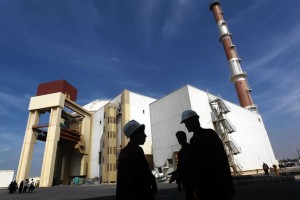 No one really believed that the�latest round of�international negotiations with Iran over its nuclear program would produce a�breakthrough. So it was no surprise that it did not, despite the�concessions that were made at�the meeting in�Kazakhstan by�the P5+1 (China, France, Russia, the�United Kingdom and�the United States, plus Germany). Washington's belief that a�harsh sanctions regime could coax Iran into�a deal has proved to�be unrealistic.
No one really believed that the�latest round of�international negotiations with Iran over its nuclear program would produce a�breakthrough. So it was no surprise that it did not, despite the�concessions that were made at�the meeting in�Kazakhstan by�the P5+1 (China, France, Russia, the�United Kingdom and�the United States, plus Germany). Washington's belief that a�harsh sanctions regime could coax Iran into�a deal has proved to�be unrealistic.Despite being isolated and�ostracized, Iran has managed to�gain some strategic breathing room with the�help of�countries like China, Russia, India, Syria and�Venezuela, allowing it to�resist Western pressure. More important, even though the�severe sanctions regime led by�the U.S. is bound to�be imperfect, it only hardens further Iran's resistance.
To�be sure, Iran's alliances are vulnerable to�erosion, and�in the�case of�two staunch allies, Syria and�Venezuela, to�outright collapse. Even so, Russia and�China continue to�take a�much more lenient approach to�Iran and�its pursuit to�gain the�capability to�produce nuclear weapons. While the�Western powers have embraced ever-harsher sanctions, Russia and�China view Iran as a�tool in�their global competition with the�U.S.
China's Iranian interests boil down to�economics. Bilateral trade stands at�about $40 billion a�year. China is not only Iran's largest customer for�crude oil, but also a�colossal investor�� somewhere between $40 billion and�$100 billion�� in�Iran's energy and�transportation sectors. True, China cannot entirely overlook U.S. pressure and�the staunch opposition of�its top oil supplier, Saudi Arabia, to�Iran's nuclear program. But, while China has supported the�mandatory sanctions set by�the United Nations Security Council, it has rejected the�West's unilateral measures.
With bilateral trade worth only about $5 billion annually, Russia's economic interests in�Iran are fairly modest. But it fears Iran's ability to�cause trouble, particularly by�stirring up unrest among Russia's Muslim citizens. Moreover, the�U.S. has refused to�pay the�Kremlin's high price�� curtailment of�congressional human rights legislation and�abandonment of�plans for�ballistic missile defense in�Europe�� for�Russian support on�Iran.
The�problem with the�U.S. drive to�have key stakeholders join its anti-Iran crusade is that some of�them live in�neighborhoods where Iran is an�important factor�� India, for�example. India is certainly alarmed at�the possibility of�Iran developing nuclear weapons, not to�mention the�possible effects of�Iran's Islamist fundamentalism on�Kashmiri Muslims. But India's $14 billion in�annual bilateral trade, and�its dependence on�Iranian oil are key strategic considerations.
Moreover, India needs Iran as an�alternative trade and�energy conduit to�Central Asia, bypassing rival Pakistan, and�also as a�hedge against an�uncertain future in�Afghanistan after the�U.S. withdraws in�2014. As a�result, India's policy mirrors China's: It has aligned itself with mandatory international sanctions but has abjured voluntary Western financial restrictions.
The�equivocal nature of�Iran's alliances, however, can be a�mixed blessing. Yes, a�harsh sanctions regime might still gain additional supporters, but an�Iran with its back against the�wall would probably be even more obstinate in�its nuclear drive. After all, Iraq was an�easy target in�the first Gulf War precisely because it had abandoned its nuclear program. It had no weapons of�mass destruction to�use as a�deterrence threat. Similarly, Libya's Moammar Gadhafi exposed himself to�a NATO onslaught by�relinquishing his weapons of�mass destruction.
By�contrast, North Korea shows that defiance, rather than accommodation, is a�strategy that works. That is why Syria, with North Korean assistance, tried to�develop a�nuclear program, which were presumably destroyed by�Israel's officially unacknowledged "Operation Orchard" in�2007. Iran will not consider abandoning its nuclear insurance policy unless a�broad agenda is agreed upon that addresses Iran's concerns as a�regional power and�secures the�immunity of�its Islamist regime from�U.S. actions.
Albert Einstein's definition of�insanity as "doing the�same thing over and�over again and�expecting different results" could be applied to�the United States' Iran policy. The�diplomacy of�sanctions, ostracism and�brinkmanship has failed resoundingly. As Iran's uranium enrichment and�other weapons development activities continue unabated, the�U.S. needs to�make a�break with the�old rules of�engagement.
By The Moscow Times
The Iran Project is not responsible for the content of quoted articles.










